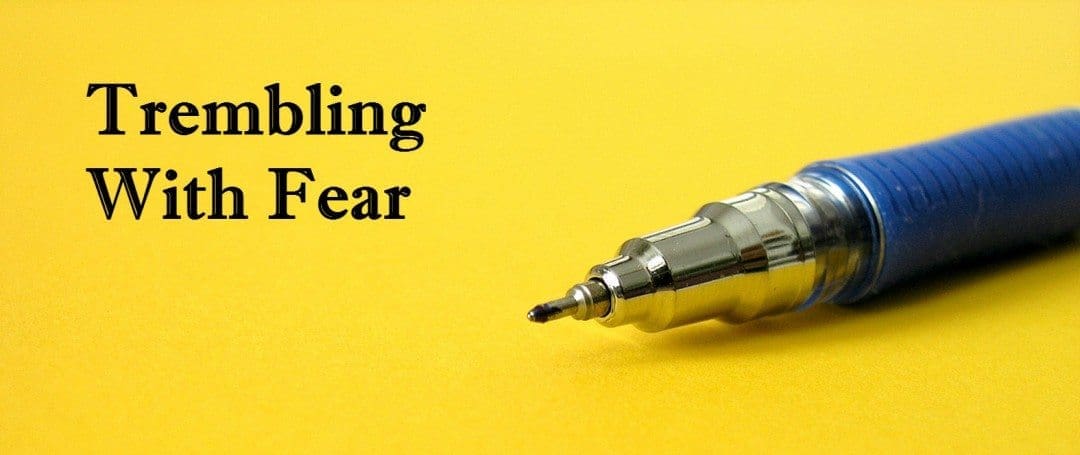Trembling With Fear 12/10/2017

So the season is almost on us, although in many places it seems to have been going on since early Autumn; I think I spotted my first Christmas ads back in September. You can’t ignore it and it brings with it a horror of its own … the pressure to buy, the pressure to have the ‘perfect’ Christmas, the pressure to join those office parties you’d rather avoid. How do people cope with pressure, deal with stress? Drink? Probably. But a good alternative is to write. Use your stories as therapy, channel your angst and frustration onto the page, carve your horrors in ink. We need stories, drabbles and flash, and a lot more of them. Use the holiday to give yourself a gift, the gift of writing time. We look forward to the results.
Just a side note, we’re low on Drabbles for the first time in months! At any rate, it’s nearing the end of our first year of running Trembling With Fear. We’ve had a blast reading and helping critique your stories and hope you’ve had fun writing them. We have a few changes in mind for the upcoming year though nothing that will kick off right as January sets in.
Can you feel the excitement in the air as we prepare to see if we can put together an anthology of everyone’s work so far? (Editor’s note: That isn’t excitement. It is actually a mix of pure fear, stress, and adrenaline!)
‘Trembling With Fear’ Is Horror Tree’s weekly inclusion of shorts and drabbles submitted for your entertainment by our readers! As long as the submissions are coming in, we’ll be posting every Sunday for your enjoyment.

David and Goliath
The laboratory was badly lit, the mains electricity had been off for a week. Paul was relying on a diesel generator to power minimal lights and essential equipment. The place was deserted, none of the staff had turned up that morning. Only he and John were still working, and that was because they’d been camping out in the lab, rather than going home. Paul guessed the rest of the team were either dead or dying.
Paul looked round at the piles of dirty glassware, discarded plastic and latex gloves. He didn’t have the time or the inclination to clean up. Instead, he continued to run the assay, his mind elsewhere. What would the latest results show? There were some interesting new compounds, they might be effective. Would they be saved? The door opened. John entered, his white lab-coat stained with blood.
“I’ve got the results.”
“I was hoping you had. Anything?”
John shook his head.
“The delta-blockers had zero effect. Same with the chloro-quinolones. Nothing is touching it. It’s still completely resistant. Every time we hit it with a new molecule, it spits out another set of enzymes to destroy it.”
Paul felt a wave of disgust and despair. He looked at the window, at the world outside.
“We don’t have a chance.”
“What do we do now?”
“See if any of the other labs have made progress. Check London, Geneva and Rome. They were all working on different formulations.”
“Will do, but I doubt…”
“I know,” interrupted Paul, “but do me a favor and check anyway.”
John nodded and headed out. Paul stood and walked to the window. The lab was on the fourth floor of the university building. He looked down at the street below. The cultists were still there, standing behind the barricades. They were protesting the research, as they did every day. They wanted the world to end, they wanted the world to burn.
“You got your wish,” whispered Paul. His head felt hot against the cool glass.
Two years, that was all it had taken to turn the world to shit.
“From inconsequential beginnings, dynasties will fall.”
It was a popular quote from the cultists. He stared at a Petri dish sitting on the bench.
“Just a wee microbe. Nothing special.”
Paul thought back to how quickly disaster had overtaken the human race. The first case had been in Spain. An infection, acquired in hospital. It was considered routine until the clinicians realized the patient wasn’t responding to any antibiotic. The bacterium causing the infection had developed complete resistance. The woman had died in agony.
That was just the beginning. The germ that killed the patient in Spain spread, first to rest of the hospital, then to the local city. Thousands were affected, hundreds were dead. The local authorities had requested help in containing the infection. From that point onward, Paul and his colleagues kept a close eye on the spread of the disease, hoping it would be checked. It wasn’t to be.
Within a month Spain had declared a nationwide epidemic. By this time every global health organization was involved. Travel bans were imposed, but it was too late. Two months after the first Spanish fatality, cases popped up in the U.S. and China. Six months later a global pandemic was declared. The fatality rate was 98%. This organism didn’t discriminate. If you got it, you died. It was as simple as that.
Paul remembered the day the email had arrived. It was a call to arms. Laboratories all over the world had rushed to find a way to destroy the organism. Pharmaceutical companies, universities and governments all frantically collaborated. Some were tasked with finding a new antibiotic. Others were challenged with developing a vaccine.
Hundreds of people, including Paul and his team, worked round the clock to achieve these twin goals, while the number of the infected grew exponentially. Hospitals were overwhelmed. People were told to stay at home, no matter how ill. Schools and colleges were closed. Subways, buses and other mass transit systems were suspended. Funeral homes refused to take the dead. Corpses were collected by the military, until there weren’t enough healthy soldiers available. After that, the bodies piled up in the streets or quietly decayed in their homes. When Paul heard that news, he knew it was over. Humanity was finished when there was no one left to bury the dead.
It didn’t take long for the tipping point to be reached. Hospitals shut down. Transport ceased. Stores closed. Paul’s laboratory was one of the few that still functioned, thanks to the judicious purchase of the generator and supplies of diesel, but the chance of finding an effective antibiotic was now remote. Finding a vaccine was even more unlikely. Too many scientists and physicians were dead or ill. The critical mass for such large-scale research had been lost. But, a few laboratories kept working, kept hoping.
Paul continued to stare at the small yellow colonies on the Petri dish. So far, he’d been unaffected. His parents, his wife, his kids and most of his friends and colleagues were dead. He suppressed the grief he felt. John re-entered the lab.
“Nothing. They’ve all got the same results as us. They’re shutting down.”
“I expected as much. Well, that’s it. There’s no more drugs to test, we’ve exhausted all possibilities.”
“Even if we found something that worked, how we would get it manufactured and distributed?”
“We wouldn’t. It’s too late. It was always too late.”
“I don’t feel well.”
“We’re all infected, John. You know that.”
John started to cry.
“I’m going home. I know my parents are dead, but I want to be with them.”
Paul embraced his friend, then walked to the window to watch him push his way through the cultists. He knew he would never see him again. He could feel the bacterium in his gut, spewing its toxin into his bloodstream. There was no treatment, nothing he could do. He regarded the Petri dish. He put his finger onto the surface of the agar and scooped up a layer of bacterial colonies. He sucked his finger clean and swallowed.
“Might as well give my killers some allies to help their cause.”
He smiled. In the end, it hadn’t been a comet, or nuclear apocalypse. Nature herself had finished humanity. The smallest creature on the surface of the Earth had doomed the most intelligent, the most advanced species. David had once again defeated Goliath.
R.J. Meldrum
R. J. Meldrum is an author and academic. Born in Scotland, he moved to Ontario, Canada in 2010 with his wife Sally. His interest in the supernatural is a lifetime obsession and when he isn’t writing ghost stories, he’s busy scouring the shelves of antique book-sellers to increase his collection of rare and vintage supernatural books. During the winter months, he trains and races his own team of sled dogs.
He has had stories published by Sirens Call Publications, Horrified Press, Trembling with Fear, Darkhouse Books, Digital Fiction and James Ward Kirk Fiction.
You can find out more about RJ at his homepage.

Little Louis
Louis was such a sweet boy. He always helped me with the groceries, wanting no reward for himself. When my husband would go away on business, Louis would always come around. I could tell he had a crush. It was sweet in a way, him only being at the ripe age of twelve. He would look at me with his big brown eyes with such infatuation. Although delightful, I had hoped Louis would have been faster. He screamed more than I had thought as well. Didn’t put up much of a fight either. I’ll bury Louis’s body in the morning.
Eric Baker
Eric Baker is a professional cook and freelance Horror and Comedy writer from Chattanooga, TN. He currently lives in Twin Falls, Idaho with his wife and nine year old son.
Sunday Roast
“We need food, not words.”
“Then let the words of the Lord feed your soul,” said the priest.
“Gave up on our souls a long time ago,” grinned Jackson. “It’s our stomachs we need to take care of now.”
“Listen to me. I can give you sustenance.”
“On that we are agreed, Father.”
The priest smiled, a hopeful expression filling his face. “Perhaps a prayer?”
“Of course, Father. I have one that is pretty apt.”
The priest smiled as the men formed a circle around him. His flock.
“For what we are about to receive,” said Jackson.
The smile vanished.
Stephanie Ellis
Stephanie Ellis is a TeachingAssistant in a Southampton secondary school but previously worked for many years as a technical author. Her genre fiction short stories have found success in Massacre and Sanitarium magazines as well as a variety of horror anthologies. She is also an active member of theFlashDogs flash fiction online community where most of her contributions are of the darker kind. Also, co-curator and co-editor at The Infernal Clock.
You can find out more about Stephanie at: http://stephellis.weebly.com/.
Through The Jungle
Jack’s arm ached as he brought the Machete through another set of vines. Darkness would be coming soon, and he needed to make the cave by nightfall. The going had been slow since his guides had abandoned him.
He only needed to make it another mile but nature itself was trying to keep him away.
He smirked.
If he was right, what lay in the cave was by no means natural. At least not to this world.
His arm screamed as the Machete cleared the path before him.
Nothing would stop him from reaching his destination and what lay within.
Stuart Conover
Hey! It’s the person who planted the seeds for the Horror Tree! You can read my bio below so if you’re checking this out please make sure to subscribe to our mailing list and follow the site (and all of the staff writers) on social media! Thanks!












I sent in a drabble so Im trying to help 😀
Thanks so much!